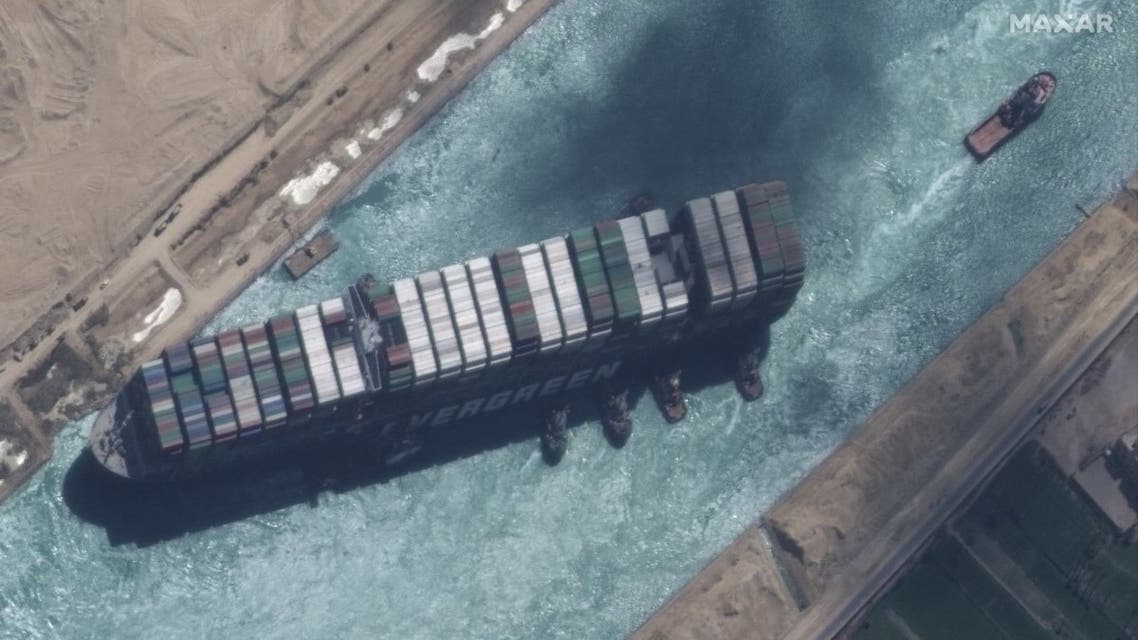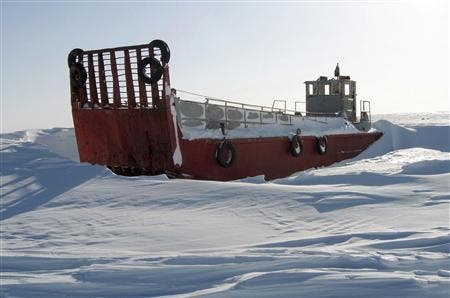
This satellite imagery released by Maxar Technologies shows a close up overview of the MV Ever Given container ship and tugboats in the Suez Canal on March 29, 2021. (AFP)
Rami Rayess
AL-ARABYA
Published: 14 September ,2021
Since the mega-sized container ship Ever Given blocked the Suez Canal earlier this year - creating a global logistical nightmare in the process - debate covering future solutions to tackle similar crises is ongoing.
As globalization’s pace quickens unabated trade deals that contain strict transportation times and costs are par the course.
The Suez Canal has monopolized international trade routing since 1869. The Panama Canal also conquered an important chunk of global shipping and trade when it was inaugurated in 1914.
Alternative routes are essential.
The Northwest Passage is one clear solution, and navigating successfully this body of gradually melting water found around northern Canada is getting closer. It will eventually replace the Suez Canal as the world’s favored shipping route to link the Atlantic and Pacific Oceans.
Environmental cynics may claim that the opening up of the Northwest Passage as the sea ice melts is one benefit of global warming. Regardless of the moral rights and wrongs of this view, they are correct.
There’s a great deal of romance for seafarers looking at the Northwest Passage. Always seeking quick routes, and facing the challenge of finding them, over the centuries sailing through the Northwest Passage, following the Northeast channel and tacking around the Horn of Africa were the toughest routes for the earliest modern maritimers.
The mission of 1845 when HMS Erebus and HMS Terror set out from England under the command of Sir John Franklin to find the Northwest Passage is the stuff of legend. Much of Europe had tried attempting this, but had always failed.
Both vessels were last seen to the east of the entrance of the Passage, but from there the crew and ships disappeared never to be seen again.
The shipping route no longer offers the challenge of navigating it, and in the process, some might say has lost the mystery and intrigue from centuries ago.
With expectations that the ice will melt totally in the Arctic by 2050, the route will become fully navigable for mega container ships.
Right now the impediments facing all countries considering using the Northwest Passage include: the need for advanced ships and technology; high insurance costs, and the fees involved with using icebreaker escort vessels.

With expectations that Arctic sea ice will melt totally by 2050, the Northwest Passage will become fully navigable for mega container ships. (Reuters)
A positive for Egypt are the benefits it can capitalize on from geopolitical differences between the major international players that will clash over the Northwest Passage.
There are many issues facing the countries attempting to lay claim to it.
These include legal questions about international access to the waterway. Is it a passage or a strait? This question appears innocuous and irrelevant, but in maritime law the answer will determine which nation can do what. If it’s a strait, then countries across the globe can access it without ramifications. At the moment Canada lays claim, but this has yet to be tested in court.
China, although in no way has direct access to the channel from its borders, is eyeing it as a future avenue to transport its billions of dollars-worth of goods it moves around the world each year.
In 2016 the country’s maritime authority published a guide tracking ice conditions through the channel. It also included nautical charts. An ice-free passage would be ideal for China and the other grand trade tycoons at the international level.
For journeys between Europe and Asia, travelling Northwest is two or three weeks faster than passing through the Suez.
A maritime trip from Shanghai to Rotterdam is a little under 20,000 km passing through the Suez Canal. Taking the Northwest Passage route cuts the distance to 16,000 km, and by decreasing the travel time and costs in this scale will increase profits substantially.
Egypt generates revenues of around 13 million euros ($15 million) daily from the Suez Canal totaling 4.8 billion euros ($5.7 billion) annually. According to an estimate by Lloyd’s more than eight billion euros worth of goods pass through the canal each day.
For the next couple of decades, the Suez Canal will remain an indispensable waterway that serves international trade and a passage that connects different parts of the world.
Of course, many benefits from using the Suez Canal will remain, particularly involving multiple drop-off port routes, but the mega containers will use the Northwest Passage soon enough.
So, for now the Suez Canal has a stay of execution, but it’s only a matter of time before the Northwest Passage makes the the water channel surplus to the requirements of global trade, and Egypt must ready itself for that day.
Published: 14 September ,2021
Since the mega-sized container ship Ever Given blocked the Suez Canal earlier this year - creating a global logistical nightmare in the process - debate covering future solutions to tackle similar crises is ongoing.
As globalization’s pace quickens unabated trade deals that contain strict transportation times and costs are par the course.
The Suez Canal has monopolized international trade routing since 1869. The Panama Canal also conquered an important chunk of global shipping and trade when it was inaugurated in 1914.
Alternative routes are essential.
The Northwest Passage is one clear solution, and navigating successfully this body of gradually melting water found around northern Canada is getting closer. It will eventually replace the Suez Canal as the world’s favored shipping route to link the Atlantic and Pacific Oceans.
Environmental cynics may claim that the opening up of the Northwest Passage as the sea ice melts is one benefit of global warming. Regardless of the moral rights and wrongs of this view, they are correct.
There’s a great deal of romance for seafarers looking at the Northwest Passage. Always seeking quick routes, and facing the challenge of finding them, over the centuries sailing through the Northwest Passage, following the Northeast channel and tacking around the Horn of Africa were the toughest routes for the earliest modern maritimers.
The mission of 1845 when HMS Erebus and HMS Terror set out from England under the command of Sir John Franklin to find the Northwest Passage is the stuff of legend. Much of Europe had tried attempting this, but had always failed.
Both vessels were last seen to the east of the entrance of the Passage, but from there the crew and ships disappeared never to be seen again.
The shipping route no longer offers the challenge of navigating it, and in the process, some might say has lost the mystery and intrigue from centuries ago.
With expectations that the ice will melt totally in the Arctic by 2050, the route will become fully navigable for mega container ships.
Right now the impediments facing all countries considering using the Northwest Passage include: the need for advanced ships and technology; high insurance costs, and the fees involved with using icebreaker escort vessels.

With expectations that Arctic sea ice will melt totally by 2050, the Northwest Passage will become fully navigable for mega container ships. (Reuters)
A positive for Egypt are the benefits it can capitalize on from geopolitical differences between the major international players that will clash over the Northwest Passage.
There are many issues facing the countries attempting to lay claim to it.
These include legal questions about international access to the waterway. Is it a passage or a strait? This question appears innocuous and irrelevant, but in maritime law the answer will determine which nation can do what. If it’s a strait, then countries across the globe can access it without ramifications. At the moment Canada lays claim, but this has yet to be tested in court.
China, although in no way has direct access to the channel from its borders, is eyeing it as a future avenue to transport its billions of dollars-worth of goods it moves around the world each year.
In 2016 the country’s maritime authority published a guide tracking ice conditions through the channel. It also included nautical charts. An ice-free passage would be ideal for China and the other grand trade tycoons at the international level.
For journeys between Europe and Asia, travelling Northwest is two or three weeks faster than passing through the Suez.
A maritime trip from Shanghai to Rotterdam is a little under 20,000 km passing through the Suez Canal. Taking the Northwest Passage route cuts the distance to 16,000 km, and by decreasing the travel time and costs in this scale will increase profits substantially.
Egypt generates revenues of around 13 million euros ($15 million) daily from the Suez Canal totaling 4.8 billion euros ($5.7 billion) annually. According to an estimate by Lloyd’s more than eight billion euros worth of goods pass through the canal each day.
For the next couple of decades, the Suez Canal will remain an indispensable waterway that serves international trade and a passage that connects different parts of the world.
Of course, many benefits from using the Suez Canal will remain, particularly involving multiple drop-off port routes, but the mega containers will use the Northwest Passage soon enough.
So, for now the Suez Canal has a stay of execution, but it’s only a matter of time before the Northwest Passage makes the the water channel surplus to the requirements of global trade, and Egypt must ready itself for that day.
No comments:
Post a Comment